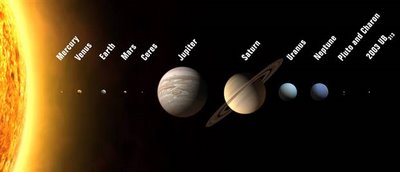Well folks, the astronomers have deemed it true. Pluto is no longer officially classified as a planet, pass it on.
There's not much to say really, except this is a pretty big piece of news to report. It kind of awakens the little kid in me that loved space. It's not everyday when people just go and reclassify heavenly bodies. I'm interested, really, why the controversy over what exactly a planet happens to be is just now making news. So, with Pluto's "demotion" what becomes of its legacy? Now grade school kids have eight planets to count about instead of nine. Pluto has always been a gimp planet to begin with, with its tilted orbit and the fact that it makes its way into Neptune's orbit during its year (i.e. its own orbit around the sun), which comes to about 248 Earth years. (Doesn't saying "Earth years" sound like you're in some corny 1950s space movie? I've always wanted a ray gun.) Because of this, Pluto can actually be closer to the sun than Neptune ever gets, sometimes. The fact that it swerves into Neptune's orbit makes it possible for Pluto to collide right into Neptune, doesn't it? When (if?) that happens, talk about a celestial shitstorm.
Planets now have a checklist for official classification, so a bunch of those chunks of frozen gases way the hell out there in our solar system no longer appear to be even tinier planets. Part of me remembers that Pluto had a bunch of moons (three "official" moons, and a lot of other space junk orbiting it too).... I guess those are nameless non-lunar lumps of ice now too.  I'm curious to know if our solar system has more stuff orbiting it than your average solar system.... maybe the typical solar system out there only has three or four planets? We have a big old asteroid belt too. I'm surprised that objects as far away from the sun as Pluto et. al. actually maintain something of an orbit. All that stuff way out there now classifies as "trans-Neptunian". Pretty cool name, I think. I'm no astronomer, but maybe all things floating in space have to be in the orbit of something....? You can't just have rogue rocks kicking around out there, can you?
I'm curious to know if our solar system has more stuff orbiting it than your average solar system.... maybe the typical solar system out there only has three or four planets? We have a big old asteroid belt too. I'm surprised that objects as far away from the sun as Pluto et. al. actually maintain something of an orbit. All that stuff way out there now classifies as "trans-Neptunian". Pretty cool name, I think. I'm no astronomer, but maybe all things floating in space have to be in the orbit of something....? You can't just have rogue rocks kicking around out there, can you?
Oscar People at the Grammys - How'd They Fare?
11 hours ago

3 comments:
When I was a kid, Pluto never counted because there was no way we could get there by conventional rockets and it was colder than anything.
If you get a chance, please, go to the Museum of Natural History and check out "Collison Course." I'm dying to know what I slept through. I do remember that the segment that explains how the moon was created from the Earth was fascinating, but the jet lag hit me all at once by then.
Unfortunately, there is a gravitational resonance between Neptune and Pluto's orbits which prevent them from coming closer than about 100 million miles from one another. Sorry to burst the bubble.
The stuff way the hell out there are part of the Kuiper Belt or Oort Cloud, where the majority of comets originate. It is a collection of millions upon millions of objects of various sizes, slowly rotating around the sun and just kickin' it, for lack of a better astronomical term.
Enjoy nerdy astronomy facts.
So glad I stumbled here via Development Hell to find lots of nerdy planet/non-planet facts - I'd be pretty cheesed off if I was Pluto, getting downgraded. And now I guess "Richard of York Gave Battle In Vain" no longer works - oops, that's rainbow colours - what's the one for planets?
Post a Comment